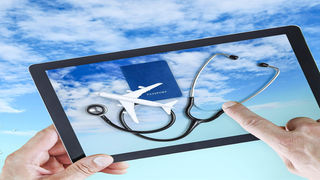Breaking News: Ruto orders postponement of school reopening

Medical tourism is when a person seeks medical attention in a country other than their own.
| FotosearchNews
Premium
Covid-19 hits medical tourism, cut numbers
The Covid-19 pandemic has pushed hundreds of Kenyans into poverty, with many experiencing a significant deterioration in their health because they have delayed medical procedures.
The number of Kenyans travelling out of the country on medical grounds has reduced by nearly 40 percent since 2019.
Data from the Kenya Medical Practitioners and Dentists Council (KMPDC), the agency that has developed rules for referral of patients abroad, reveals that medical tourism has been decimated by coronavirus restrictions, with 158 Kenyans travelling abroad for treatment in 2021 and 155 in 2020.
This is a huge decline from the patients who sought referral from the council in 2019, when 423 patients were given the nod to travel.
The figure accounts for only the patients who sought clearance from the council and needed the National Health Insurance Fund (NHIF) to help with their medical bills abroad. It does not include those with private insurance, who go directly without authorisation from the council.
Data from the Ministry of Health estimates that Kenyans spend Sh1.6 billion on medical tourism, with a majority travelling abroad for surgeries. The most common referrals are those to do with oncology, heart disease and organ transplants, the council reveals.
In 2020, majority of the patients (129) out of the 158 who went abroad, travelled to India, with 81 travelling for surgeries and 36 for transplants. The KMPDC data shows that out of the 155 patients who travelled in 2021, again, India was the destination of choice, with 116 seeking to have surgeries and medical review.
KMPDC chief executive Daniel Yumbya said the main causes of this decline were the implementation of travel restrictions and the global postponement of the majority of elective procedures in an effort to minimise the spread of the disease.
“In any given year, hundreds of Kenyans troop to hospitals abroad in search of treatment. Between January and December 2019, more than 400 patients were cleared by the Ministry of Health and KMPDC to travel abroad for treatment. The numbers recorded in 2020 are slightly lower due to the lockdown imposed to mitigate the spread of Covid-19,” he wrote on the council’s website.
He added that although some of the services sought abroad are available in Kenya, a number of patients genuinely travel for services that are unavailable in the country, which is why the council developed regulations for overseas referrals.
“The rules determine the procedure for referrals and eliminate sporadic or unwarranted referrals that fleece Kenyans. This means that Kenyans who want to seek treatment abroad must inform the Ministry of Health and KMPDC about their intent,” said Mr Yumbya.
He said, however, that the cost of travelling abroad is not easy and warned that there are some hidden costs that may lead to the detainment of patients in foreign countries for unpaid medical bills.
“Whereas the treatment expenses overseas in some cases may appear pocket-friendlier than the costs in Kenyan hospitals, many patients travel, oblivious of a myriad added costs resulting from travel. Besides the hospital fees, patients pay for accommodation, air ticket and food as separate bills. In most cases, family members accompany the patients, adding onto the costs,” he said.
The decline of medical tourism is, however, not limited to Kenya, with Covid-19 devastating the whole medical tourism ecosystem because of the uncertainty over travel restrictions and quarantine measures that kept changing across the world.
The Medical Departures, a Bangkok-based medical travel agency, reveals that since the initial global lockdown to curb the spread of the coronavirus, medical travel bookings went down by more than 89 percent in the most popular destinations.
Locally, the number of surgeries also suffered a great deal, with many Kenyans forced to delay their surgeries at the height of the pandemic. Patients who suffered the most are those who needed elective surgeries, with kidney transplants falling under the category despite the surgery being a necessity for patients who have kidney failure.




